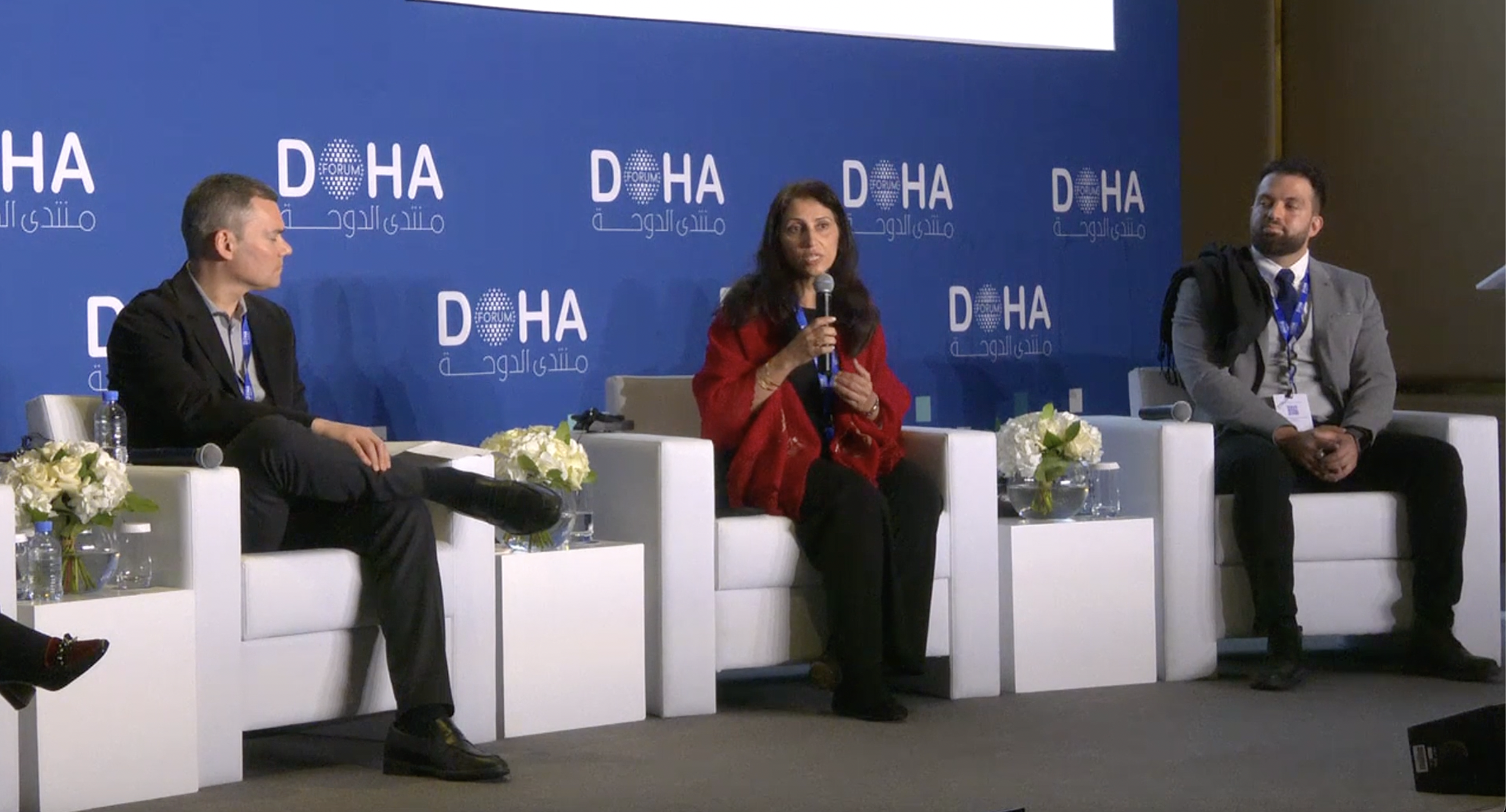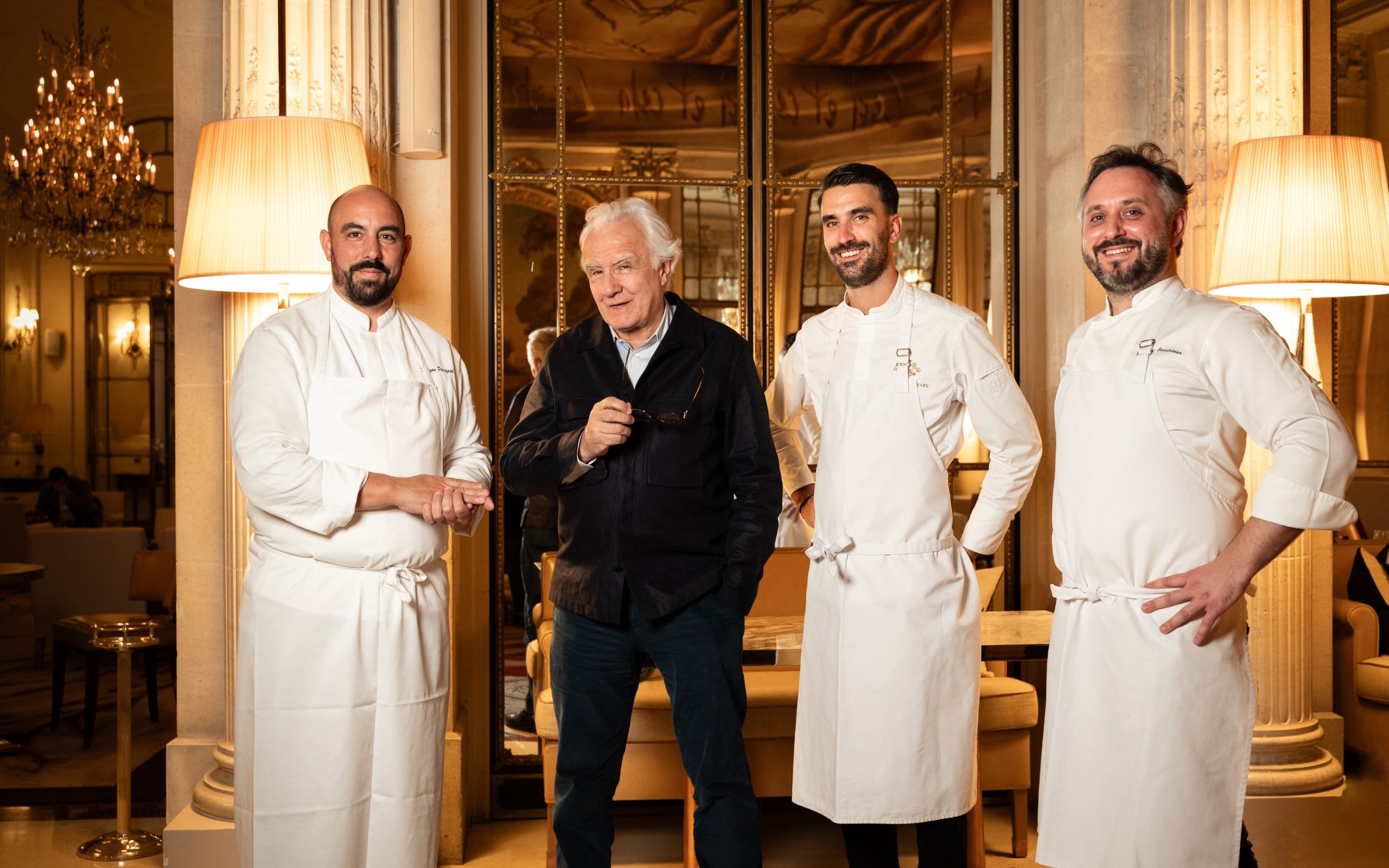A Doha Forum panel on ‘Reshaping Palestinian Narratives: Who is Listening And Can it Make a Difference?’ addressed the Palestinian struggle against the Israeli occupation.
Fadi Quran, the Campaign Director at Avaaz, asked the diverse Doha Forum audience to raise their hands if they believe that Israel is practicing the crime of apartheid against Palestinians.
The vote was unanimous, except for a few attendees.
“I know the people who didn’t raise their hands are mostly American diplomats,” he joked. That was how the Palestinian activist demonstrated that rise of support for the cause when he was asked about its possible decline in the Global South.
During a Doha Forum panel on ‘Reshaping Palestinian Narratives: Who is Listening And Can it Make a Difference?’, Quran spoke alongside Diana Buttu, a Palestinian Human Rights Lawyer, Peter Beinart, Editor-at-Large at Jewish Currents, and Baroness Sayeeda Warsi, Member of the UK’s House of Lords. The panel was moderated by Daniel Levy, CEO of USMEP.
The panel was held on Monday, on the final day of the 20th edition of Doha Forum. It addressed a range of topics around the Palestinian struggle against the Israeli occupation.
The speakers discussed how Palestinian voices have been excluded from mainstream media and cornered by the international community, who have invested in social media as an alternative.
Social media activism and citizen journalism started steadily succeeding. May 2021 marked a stark shift in the discourse surrounding the Palestinian liberation struggle, which was achieved through the efforts of Palestinians like Mohammed Elkurd.
Buttu stated that human rights organisations are finally repeating what Palestinians have been saying for decades. “This is a settler-colonial regime, the apartheid label is no longer just applicable to the West Bank and the Gaza Strip, they’re now recognising that there is apartheid inside Israel.”
The former spokesperson for the Palestine Liberation Organisation also urged Palestinians to define their own narrative, and not make their voices “palatable” for the West.
“Our destiny is in our hands, we will take control of it,” said Quran, noting the heightened sense of urgency amongst young generations of Palestinians, a tone that has been “suffocated and sidelined” for “the last 30 years”.
The panelists also called for a rise in Arab conscience. Because while an overwhelming majority of Arab youth stand behind the Palestinian liberation, they lack the awareness and detailed knowledge needed.
Palestinian Authority
The panel discussed the Palestinian Authority (PA), which is the Fatah-controlled government body that exercises partial civil control over the West Bank in areas “A” and “B”. This was a result of the 1993–1995 Oslo Accords.
Buttu, who served as a legal advisor to the Palestinian negotiating team from 2000 to 2005, stated that the PA cannot be reformed in any way shape or form to reflect what Palestinians want.
This is reflected in recent polls that showed two out of three Palestinians who bear the brunt and brutality of the Israeli occupation, want Mahmoud Abbas to resign.
“The PA continues to occupy too much space and dominate the narrative,” said Buttu, urging fellow Palestinians to “seize this opportunity and change for our own destiny.”
Quran echoed the same sentiments, adding that there’s an effort “to arrest, to murder, and to silence” Palestinians who go against the PA, giving the example of the late Nizar Banat and Basil Al Aaraj, who were brutally assassinated.
He also reiterated that both the PA and Israeli government are collaborating to fight any Palestinian voices, and prevent them from rising.
Western hypocrisy
The speakers also criticised the hypocrisy of policy makers and the general public in their response to the war in Ukraine compared to the Israeli occupation of Palestine.
“All those things we said in the past were too difficult to do we are now doing,” said Baroness Warsi, who had resigned from her position as senior Foreign Office minister in 2014 in protest of the UK government’s policy on Gaza, which she described to be “morally indefensible.”
She also added that “policy making is hypocritical, the challenge becomes real when the hypocrisy becomes so avert and obvious,”
Quran called for isolating Israel in the field of sports. “Here in Qatar and elsewhere there needs to be a push to sideline particularly Israeli teams that are supporting and engaging with the apartheid regime.”
He also advocated for an impetus on a ban of Israeli banks in the SWIFT system. Israel’s banks fund the companies building the illegal settlements in the West Bank.
Anti-Semitism smears
The most effective tool that has been deployed against Palestinian activism has been the anti-Semitism accusations.
The moderator reminded the audience of Amir Tamim bin Hamad Al-Thani’s Doha Forum 2022 opening speech, where he called out the false usage of anti-Semitism accusations. “The accusation of anti-Semitism is being wrongfully used against those who criticise Israel’s policies, and this impinges on the global struggle against racism and actual anti-Semitism,” he said.
Beinart echoed the Amir’s statement stating that the claims are irrational because it implies that the “only non-bigoted position you can hold is to support a status quo in which millions of Palestinians lack any citizenship, and the other Palestinians have second class citizenship.”
“Anti-semitism is wrong because bigotry is wrong, not because Jews are any different than anyone else,” said Beinart.
He cited a growing shift in young Jewish perceptions of Israel, “25% of American jews think Israel is an apartheid state, especially the ones under 30”.
Looking forward
“What will you do to support this cause? You have a level of agency here as well,” Quran addressed the audience in his closing remarks. “Politics is about power. If you have hundreds of millions of people around the world supporting Palestine it can be translated on a political level.”
Follow Doha News on Twitter, Instagram, Facebook and Youtube







